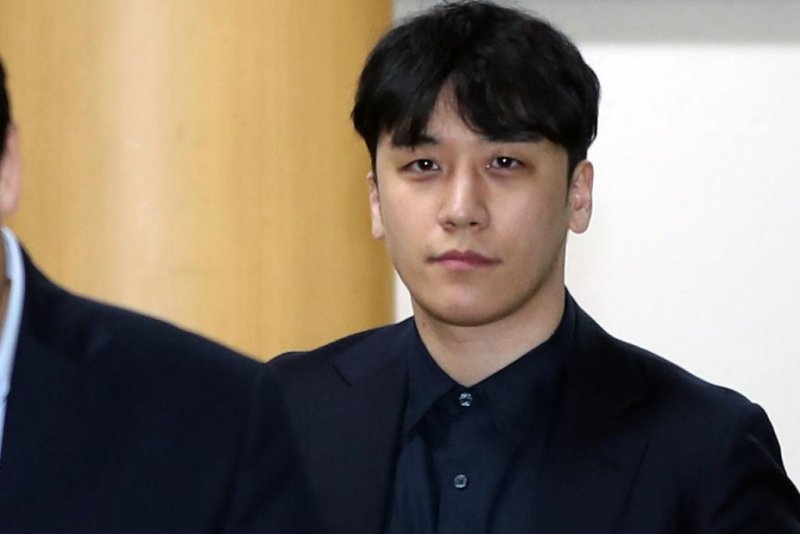1 of 3 | Big Bang singer Lee Seung-hyun -- popularly known as Seungri -- has been linked to a Gangnam-area nightclub called Burning Sun, where several women were allegedly drugged, sexually assaulted and filmed without their consent. Photo by Yonhap
SEOUL, May 10 (UPI) -- Take a look at the news in South Korea lately and it may seem like the nation is in the middle of a celebrity purge -- or even a drug crisis.
K-pop star and actor Park Yoo-chun dominated headlines after he was accused of using methamphetamine with his ex-girlfriend, Hwang Ha-na, the wealthy granddaughter of a major dairy mogul. At first, Park denied the allegations, but he has since confessed -- adding to a long list of other celebrities facing public shame for drug charges in recent months.
"I'm willing to take punishment for what I did, and I will live my life in regret," Park told reporters on Friday, outside Nambu Police Station.
Earlier in April, renown lawyer and TV personality Robert Holley was arrested for allegedly purchasing and using methamphetamine online -- a case that shook millions of South Koreans who watched him for years. That same month, the grandson of one of South Korea's largest conglomerates -- SK Group -- was apprehended for his alleged use of liquefied marijuana.
"My initial reaction was shock, because of the number of cases pouring out at one time. It all came out so suddenly," said Diane Park, 26, who works at the Korea Tourism Organization. "Lately, it seems like that's pretty much all you see on the news."
"Robert Holley's case in particular shocked me. It came out nowhere," said Soon Nim-jun, 55, of Seoul. "The incident went against his perceived character ... Robert Holley was seen as a intelligent, approachable and family-oriented person."
National flashpoint
The most high-profile case involves the Burning Sun nightclub scandal and one of South Korea's most famous K-pop stars.
Big Bang singer Lee Seung-hyun -- popularly known as Seungri -- was accused of having managerial ties to a Gangnam-area nightclub called Burning Sun, where several women were allegedly drugged, sexually assaulted and filmed without their consent. Seungri was also implicated for participating in a chatroom where these videos were shared, as well as soliciting prostitutes for foreign investors interested in his companies.
An official investigation has so far revealed that several police officers were bribed to overlook crimes at Burning Sun.
"That's what shocks and scares me the most," Park said. "I remember thinking, 'If the police are in on this, who can we trust?'"
"[The case of] using drugs to rape women was the most shocking," said Lee So-hee, a 26-year-old South Korean university student. "This whole drug scandal is ludicrous. I thought that Korea was safer than other countries because of the strong drug screenings and regulations. But, I guess if you're rich, you can [use] smuggled drugs."
A rising problem
South Korea takes drugs very seriously. While much of the United States has decriminalized or even legalized marijuana use, those who partake in South Korea can face up to five years in prison and a fine up to 50 million won ($42,730).
"Korean society does not approach drug addicts with the goal of healing them," said Kim Hyeong-gun, head of the Seoul Addiction Institute of Psychotherapy. "If one uses drugs, society immediately views them as criminals."
Arrests are also on the rise. There were nearly 6,800 cases involving a violation of the Act on The Control of Narcotics in 2017, according to the latest numbers from the Korean Statistical Information Service. That's a 126 percent increase since 2003.
"The drug problem has indeed increased," Kim said. "It is well-known that drugs are available and are being used in a lot of nightclubs in Gangnam."
However, South Korea's uptick in drug-related arrests hardly indicates a true crisis -- especially when it's compared to the United States, where a drug arrest is estimated to happen every 20 seconds. Many South Koreans still view drug use as a high-society problem limited to the wealthy.
"Celebrities tend to be very stressed out. They feel constant pressure to maintain their popularity, and so they may seek out drugs for 'self care,'" Kim said. "There is also the aspect of celebrities feeling like they're part of a privileged class by using drugs."
Even so, "ordinary Kims and Lees" are also getting caught up in drugs -- particularly meth amphetamines. And the recent wave of celebrity cases has some worried.
"It does concern me. The fact that people are turning to drugs tells me that there's something wrong," Park said. "I think the increasing popularity of drugs hints at a growing state of detachment, isolation and emptiness in our society."















